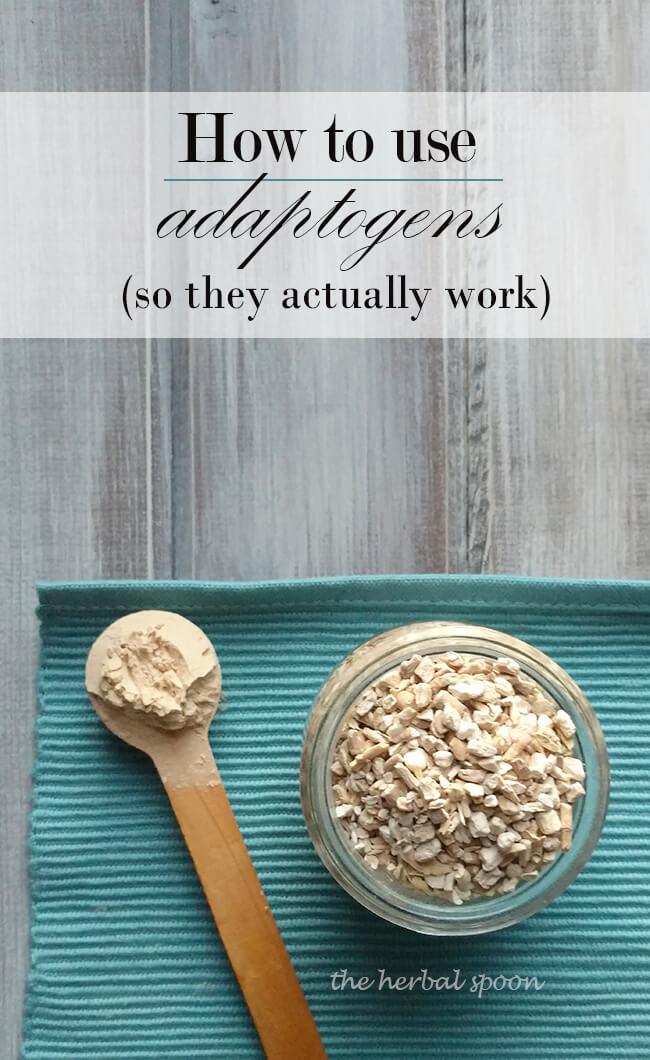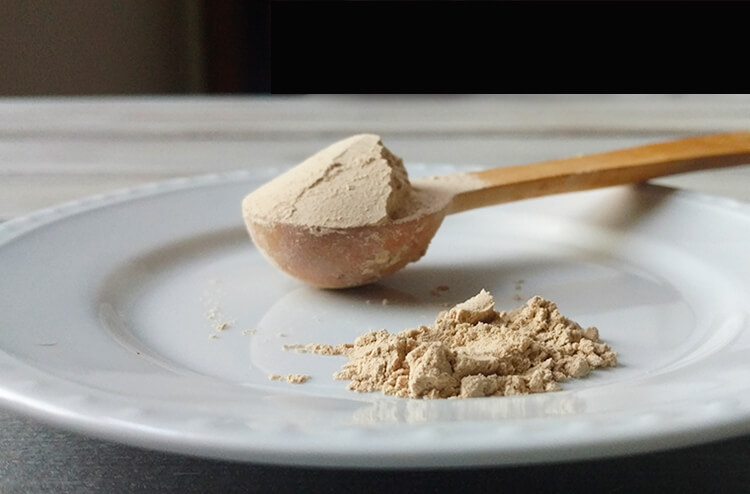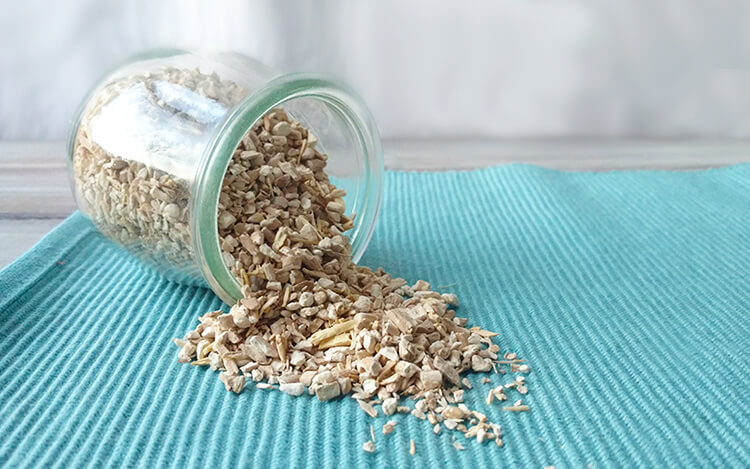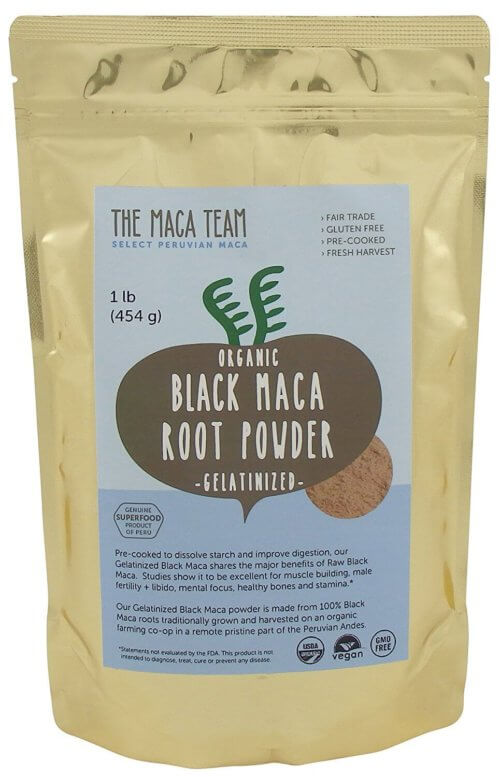
Life gets busy, we get stressed and tired, and just feel plain overwhelmed sometimes. Eating chocolate is a common (and delicious!) way to cope, but herbs can play a big role. Many are turning to herbs that have been dubbed as adaptogenic herbs to help increase energy, combat adrenal fatigue, thyroid issues and other problems.
But what are adaptogens, how do they work, and are we using them wrong?
My story of adrenal fatigue
During college I worked hard, hardly slept and hardly ate. And when I did eat, it was often cafeteria junk food or a slim fast. Yes, I really was that bad! Those years of abuse took a toll on my body, and after my pregnancy, and a year long bout with veganism, I came down with a bad case of adrenal fatigue.
I wanted to sleep for 11 hours a day. Getting out of bed was a laborious task. I was ready for a nap only hours after waking up, and by 9 pm, I’d be so full of energy (finally!) that I’d stay up for hours finally getting some work done. Unfortunately, with our crazy non- stop lifestyles, many people feel these symptoms, and it’s a condition that’s severely undiagnosed and generally not acknowledged by the conventional medical community. As moms we’re pressured to be there for everyone all of the time and the stress of mom culture can really suck the joy out of life.
What does adrenal fatigue look like?:
Common symptoms of adrenal fatigue and over exhaustion include
- Excessive fatigue or exhaustion
- Not feeling rested after plenty of sleep
- Insomnia
- Inability to lose weight
- Difficult to bounce back from injury, illness, stress or exercise
- Cravings for salty and/or sweet things
- Low blood pressure
- Low libido
- Excessive thirst and urination
- Needing caffeine to get going in the morning
- Excess hunger or, on the other extreme, lack of appetite
Irritability
What to do about it
Ok, so we know that many of us are stressed out and tired, but how do we change that? Herbal adaptogens are substances that are completely non-toxic and help the body recover and better respond to everyday stressors. They can do a whole host of positive things in the body, and here are a few.
- improve adrenal, brain and thyroid function
- offer antioxidant protection to cells
- protect against cancer
- lower the risk of heart disease
- improve our resistance to the toxins we’re constantly exposed to.
A boatload of evidence
Adaptogenic herbs don’t work on any one particular system or condition of the body, but help strengthen our bodies as a whole. If that sounds wishy washy and a little too good to be true, then listen to this. Beginning in the 1940’s, Russian scientists were tasked with identifying and studying adaptogens. Since then, they’ve published literally thousands of studies on adaptogens. There’s also an extensive history of use of these adaptogenic herbs dating back thousands of years to ancient civilizations like China and India.

Wait, not yet!
With all of this overwhelming evidence for how beneficial adaptogenic herbs are, you may be ready to rush out and buy some to increase energy and get you going. But that’s not how they work. Adaptogens aren’t the latest energy drink that will artificially stimulate your body so you can keep on abusing it.
Adaptogens work with your body as part of a holistic shift to bring the body back into balance. And different adaptogenic herbs work in different ways, so you can’t just throw an herb at the problem. We need to pick specific ones to match a specific individual. I talk more about how we often misuse natural remedies (and why they don’t work!) in this article.
You’re doing it wrong
Adaptogens support your body and help restore its systems. They will not however add fuel to the fire as you continue to abuse your body. I can’t tell you how many ladies I’ve recommended an adaptogen supplement to, and then weeks later they declare with frustration that it didn’t work. If you’re feeding your body junk, don’t eliminate stressors from your life, then add adaptogens in hoping for a “magic pill,” you’re fighting an uphill battle.
Herbalist Jim McDonald really sums it up in his article, where he compares adaptogens to credit cards. Yes, it actually does make sense once you read it.
“We should remember that one of the original uses of adaptogens was to get the working class able to handle bad working conditions with less rest and less burnout… they can help one endure an inhospitable situation or lifestyle with less negative impact. When using them, I like to encourage people to ask:
“Do I really need to endure this inhospitable situation?
Do I want to?” – Jim McDonald
How to use adaptogens so they actually work
To give your body the reset it needs, nourish your adrenals and help adaptogens do their best work, follow these tips.
- Reduce or eliminate sugar and caffeine. That includes coffee, black tea, honey, maple syrup, and other natural sweeteners that spike blood sugar.
- Go to bed by 10pm and get 8-9 hours of rest. The hormone cortisol tapers off at night, and staying up late disrupts the bodies cortisol and other hormone cycles to cause a whole host of health issues.
- Eliminate stress in your life as much as possible. Journaling, prayer and meditation are great ways to cope with situations you can’t change.
- Slow down and savor your meals. Eating too quickly causes poor digestion and further taxes the adrenals. I’ve found that listening to slow music, and counting to 15 before swallowing each bite helps me slow down and relax while eating. Maybe you’re like me and too used to eating on the run for years!
- Take walks, do yoga and other forms of exercise that you enjoy. Just avoid intense cardio, which triggers adrenaline production and further fatigues the body when there’s adrenal issues.
- Eat real, whole, nutrient dense foods. Skip processed food. Even if they’re organic non-gmo potato chips, they’re still potato chips.
Choosing the right adaptogen for you
Ok, so now that we’ve covered how to properly use adaptogens, let’s look at different adaptogens and how they support the body. There are quite a few adaptogenic herbs, and then there are classes of herbs called nervines and nootropics that complement the effect of adaptogens. If you’re looking for an awesome, more in depth reference all about adaptogenic herbs, then I’d highly recommend this book by David Winston, Registered Herbalist.
Some of the most popular adaptogens and the ones I have personal experience with are the ones I’ve included below. Please realize that its always helpful to work with a natural health practitioner so they can tailor the herbs and dosage to your specific body. I’ve given the general usage info for these herbs, but do what you feel comfortable with. I’m not a doctor and medical advice is beyond my scope of expertise!
Want more posts like this? Sign up for the Herbal Spoon Newsletter here and you’ll get the latest posts, exclusive info and deals on my favorite natural living products.

Ashwaganda
This herb is native to India, Pakistan and Africa and is frequently used in ayurvedic medicine. Historically its been used for everything from osteoporosis to the common cold. Unlike stimulating adaptogens, ashwaganda is more calming and supports the endocrine system, including the adrenals and thyroid. In human studies it was found to stimulate the thyroid and support the immune system, including autoimmune issues. Ashwaganda is also a nervine, making it useful for fatigue, brain fog and anxious feelings. It’s rich in iron and helpful for anemia and will also help increase libido.
How I use it: I’ve been using ashwaganda as part of this adaptogenic blend capsule taken twice daily. I do notice increased energy, but mainly I’ve noticed an improved presence in the moment as it helps me stay calm and focused. (Psst, I get this supplement for 60% off of retail with my membership. You can email me at jamie@theherbalspoon.com if you’re interested in getting the same deal.)
How to take it: 30-40 drops of tincture 3x daily, or 400-500mg capsules 2x daily, or 1/4 tsp decocted in 1/2 cup water 3x daily.
Who its NOT for: Anyone with hyperthyroid (over active thyroid), excess iron, who is pregnant or allergic to nightshades.
Licorice
The popular black licorice candy originally came from this herb and its well known for its distinct sweet, fennel like flavor. Its native to China, Russia and southeast Europe. This adaptogen is also anti-inflammatory, modulates the immune system, is antioxidant, anti-viral and helps expel excess phlegm. Licorice is an activator herb and increases the effect of other herbs when included in a formula. It’s especially helpful for those with adrenal fatigue who also have excessive morning fatigue, and elevated cortisol and blood sugar.
How I use it: My favorite way to use licorice is for a sore throat. Licorice tea was actually my very first experience with herbal remedies back when I was in elementary school. I was pretty excited when I found out that my favorite soothing throat tea also helps support my adrenals and blood sugar.
How to take it: 10-20 drops of tincture 3x daily, or 1 tsp decocted in 1 cup water, or 200-300 mg chewable tablets 3x daily
Who it is NOT for: May interfere with steroids and other drugs. Don’t use excessive amounts or if you have hypertension. If you’re on any drugs, then a natural practitioner may be able to help you get off of drugs and find other, safer solutions.
Holy basil or tulsi
This herb is native to the India China area and is often used there for daily support. Holy basil is an adaptogenic herb that supports and modulates the immune system, fights free radical damage, increases breastmilk production and boosts the mood. It also helps to protect nerves, reduce stress and may also help promote healthy blood sugar levels. It’s useful for brain fog, and when combined with gingko can help improve memory and attention, especially when accompanied by hyperactivity.
How I use it: I used to drink a cup of tulsi tea every morning to help balance my blood sugar, improve brain function and support my adrenals. It helped me feel refreshed and energized. Lately I haven’t been drinking it though since we’re trying for baby #2.
How to take it: 40-60 drops of tincture 3x daily, or 1 tsp infused in 1 cup water for 5-10 min 1-2x daily
Who it is NOT for: Anyone who is pregnant or wants to become pregnant. It may be toxic to the fetus or prevent pregnancy. It may also interfere with some drugs.

My favorite adaptogens right now
Currently I’ve been stirring a teaspoon or two of this Maca root powder in my morning dandy blend coffee. I love it! It helps to balance the hormones and boost fertility. The bag I have lasts me for several months. At the end of this post I have more info on maca root plus a maca milk recipe. You can find Maca and other quality adaptogen herbs here.
Do you use adaptogens? Let us know in the comments below and be sure to share this post!
Resources used:
Adaptogens: Herbs for strength, stamina and stress relief – David Winston
You left links for everything else, why not the supplement you are taking? I’d like to have a link for that, please.
thanks for this very informative and interesting article!
I’d love to Carol, but legally I’m not allowed to because of certain FDA rules. That should change in the near future though. In the meantime you can always send me an email if you’re interested 🙂
I’ve been definitely rethinking my current lifestyle. I have far too much on my plate and need to let some things go to have more leisure and rest time. Thank you for sharing with the Homestead Blog Hop!
I’ve actually just started taking Chaga in my tea and I have cordycept tea and shiitake coming as well. I did notice that after I drank my very first cup of Chaga I felt like I was coming down with a cold. It went away in about an hour but it was strange. Hoping to heal my adrenals and get down to a healthier size and lifestyle!
That is interesting. I can’t have mushrooms of any kind because I’m sensitive to mycotoxins now from living in toxic black mold for years. One of my symptoms after being re-exposed to mold is I get flu-like symptoms the next day. I’m not sure if that has any connection to your experience, but I do find that curious.
Mushrooms have both antibacterial and antifungal properties, which means that if you have mycotoxins (mold toxins) you don’t want to restrict consuming them. Some practitioners when treating patients for mold toxins tend to place them on a diet that restricts eating mushrooms to avoid getting exposed to more fungal/mold compounds, but that is the wrong thing to do. Definitely look into Reishi, lions mane, and others. I love them and thrive on those, adaptogen and a vegan diet 6+ years now.
I’m glad you found something that worked well for you! I wasn’t able to tolerate mushrooms when I was healing from mold exposure, but I’ve started using them more now.
I love ashwaganda!! I can feel such a difference on days that I take it. I add it to warm almond milk, half and half and cocoa powder. I cannot say enough good stuff about what this does to me mentally!!
I need to get back on it again. I’ve switched my supplements around lately and I need to get adaptogens back into my life!
Hi- very informative post. I was happy to see that you actually mentioned Ashwagandha being a nightshade and should, therefore, be avoided by some. It’s rare that I see an article mention that. I didn’t know that until after I had been taking an herbal blend for awhile. I have psoriasis and it causes massive flare-ups in my body. Bummer because it really does help take the edge off -stress-wise for me. I’m going to look into Maca a bit more, as I’m interested in how it can help with hormones. I don’t know anything about it.
Thank you for educating us
My son has no immune system… an herbalist mentioned adaptogens (specifically a blend with many mushrooms) may be good for him. What are your thoughts?
There are adaptogen mushrooms specifically to support the immune system. However, If someone is on immunosuppressant drugs or has other significant health issues it’s always best to consult with a clinical herbalist or naturopathic doctor first. I can’t give medical advice and without knowing your son’s health history it’s hard to say.